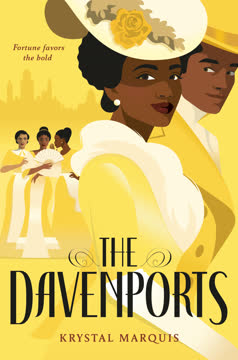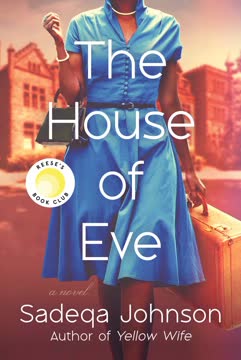Plot Summary
Gilded Beginnings, Hidden Wounds
In 1910 Chicago, the Davenports are a rare Black family of immense wealth, their fortune built by William Davenport, a formerly enslaved man who founded a carriage company. His daughters, Olivia and Helen, live in a world of luxury but are never free from the sting of racism and the weight of expectations. Olivia, the eldest, is groomed for a perfect marriage, while Helen, the younger, rebels against the constraints of femininity, preferring the grease and gears of the family garage. Their friend Ruby Tremaine, whose family's fortunes are fading, and Amy-Rose, the Davenports' maid with dreams of her own, complete a quartet of young women navigating a society that both exalts and limits them. Beneath the surface, the scars of slavery and the realities of prejudice shape every interaction, ambition, and hope.
Sisters and Secrets
Olivia and Helen's bond is both a comfort and a source of tension. Olivia strives to fulfill her parents' wishes, suppressing her own desires, while Helen's refusal to conform brings her into conflict with her family. Their shared childhood with Amy-Rose, once a playmate and now a servant, blurs the lines between class and affection. Ruby, desperate to secure her family's future, sets her sights on Olivia's brother John, but her heart is torn. Secrets fester: Helen's clandestine work in the garage, Amy-Rose's ambition to open a salon, and Olivia's growing awareness of the world's injustices. Each girl is caught between loyalty to family and the pull of her own identity.
Dreams Beyond the Manor
Amy-Rose's longing for independence drives her to save for a salon, inspired by her late mother's resilience. She faces skepticism and subtle prejudice, even from those closest to her. Ruby, meanwhile, feels the pressure of her family's declining wealth and her father's political ambitions. She is expected to marry well, but her heart is not so easily commanded. The Davenports' privilege is both a shield and a prison, as Olivia and Helen grapple with what it means to be exceptional in a world that resents their success. The girls' dreams—of love, work, and self-determination—threaten to upend the careful order of their lives.
Love and Ambition Collide
The arrival of Jacob Lawrence, a charming and mysterious Black Englishman, sets hearts aflutter and alliances askew. Olivia is drawn to him, seeing in him the promise of a perfect match, while Helen finds in him a kindred spirit who values her intellect and independence. Ruby's pursuit of John is complicated by her growing feelings for Harrison Barton, a biracial newcomer with his own burdens. Amy-Rose's friendship with John deepens into something more, but the gulf between their stations seems insurmountable. Each girl must weigh love against ambition, and the cost of following her heart.
The Ball and the Bargain
At the Tremaines' grand ball, the season's social stakes come to a head. Olivia and Jacob's chemistry is on display, pleasing their parents but stirring doubts in Olivia's heart. Helen and Jacob share a charged moment, igniting a forbidden attraction. Ruby's plan to win John's proposal by making him jealous with Harrison backfires, revealing the limits of manipulation. Amy-Rose and John share a stolen, tender encounter, but the realities of class and expectation loom. The ball is a microcosm of their world: dazzling, constraining, and full of hidden longing.
Masks of Society
As the season progresses, the girls navigate a maze of social obligations, gossip, and parental pressure. Olivia is lauded for her poise but feels increasingly suffocated by the role she is expected to play. Helen is forced into etiquette lessons, her true talents dismissed. Ruby's family's financial desperation grows, and her mother's expectations become a cage. Amy-Rose faces the painful truth that, no matter how close she is to the Davenports, she will never truly belong. The masks they wear—of dutiful daughter, perfect hostess, loyal friend—begin to crack under the strain of their desires.
Forbidden Longings
Helen and Jacob's connection deepens, their shared passion for innovation and disregard for convention drawing them together. Their feelings are dangerous—not only because Jacob is courting Olivia, but because Helen's ambitions are seen as unseemly for a woman. Amy-Rose and John's relationship blossoms in secret, but the threat of scandal and the chasm of class keep them apart. Ruby's heart is torn between the security John represents and the genuine affection she feels for Harrison. Each girl is forced to confront the boundaries imposed by family, race, and society, and to ask what she is willing to risk for love.
The Price of Progress
The rise of the automobile signals a new era, and John and Helen see the future in horseless carriages. William Davenport, however, is reluctant to abandon the legacy he built. The family's fortunes—and the livelihoods of their employees—hang in the balance. Amy-Rose's dream of a salon is nearly within reach, but she is denied a lease due to prejudice and lack of connections. Ruby's family faces ruin if her father's political campaign fails. The girls' personal struggles mirror the larger tensions of a Black community striving for progress in a world determined to hold it back.
Rivalries and Revelations
As secrets come to light, relationships are tested. Olivia is drawn to Washington DeWight, a passionate activist who challenges her to see beyond her privilege. Helen's feelings for Jacob threaten to destroy her bond with Olivia. Ruby's duplicity with Harrison is exposed, forcing her to confront the consequences of her schemes. Amy-Rose, devastated by setbacks, considers leaving Chicago altogether. The girls must reckon with the pain they have caused each other and themselves, and decide what kind of women they want to become.
Choosing Freedom
Olivia, inspired by the activists she meets, begins to question the life laid out for her. She sneaks out to attend rallies and finds purpose in the fight for civil rights. Helen, with the help of her brother, pushes for a place in the family business, refusing to be sidelined. Ruby, after heartbreak, chooses to pursue happiness on her own terms, even if it means disappointing her parents. Amy-Rose, faced with the loss of her dream, finds the courage to start anew. Each girl, in her own way, claims the right to choose her path.
Shattered Expectations
The girls' plans unravel: Olivia's engagement to Jacob is revealed as a sham, and her love for Washington is thwarted by circumstance. Helen learns of Jacob's deception and is forced to confront the limits of trust. Ruby's engagement to Harrison is jeopardized by her inability to stand up to her parents. Amy-Rose, after being rejected by John and denied her place in the world she loves, decides to leave for a new life. In the wreckage of their hopes, the girls discover the strength to begin again.
The Cost of Belonging
Amy-Rose's departure forces the Davenports to confront the ways they have failed those closest to them. John must choose between love and legacy, while Olivia and Helen grapple with the cost of their ambitions. Ruby faces the reality that true belonging cannot be bought or arranged. The girls' journeys reveal that the price of acceptance—by family, society, or oneself—is often higher than they imagined. Yet, in their losses, they find clarity about what truly matters.
Breaking the Pattern
The Davenports' annual masquerade ball becomes a turning point. Olivia chooses to stay in Chicago and fight for justice, rather than follow Washington to Philadelphia. Helen, heartbroken but wiser, resolves to forge her own path, even if it means letting go of love. Ruby finally stands up to her parents, choosing Harrison and her own happiness. Amy-Rose, empowered by her pain, sets out to build a life on her own terms. The old patterns—of obedience, silence, and self-sacrifice—are broken, making way for a new era.
Hearts in Rebellion
The girls' acts of rebellion—large and small—reshape their destinies. Olivia's activism brings her fulfillment and a sense of purpose. Helen's determination earns her a place in the family business and the respect of her peers. Ruby's honesty wins her a second chance at love. Amy-Rose's courage inspires those she leaves behind. Their stories intertwine, each girl's journey echoing the others', as they learn that true love—romantic, familial, and self-love—requires honesty, bravery, and the willingness to defy expectations.
The Power to Choose
In the aftermath of heartbreak and upheaval, the girls find solace in each other. Their sisterhood, tested by jealousy and betrayal, emerges stronger. They support one another's dreams, celebrate each other's victories, and mourn their losses together. The power to choose—to love, to work, to fight for justice—becomes their greatest inheritance. The Davenports, once defined by their wealth and status, are now a family remade by the courage of their daughters.
Truths Unveiled
As secrets are confessed and wounds begin to heal, the girls and their families confront the truths that have shaped them. The legacy of slavery, the realities of racism, and the limits of privilege are acknowledged, not as sources of shame, but as challenges to be overcome. The girls' journeys are not without pain, but they are marked by growth, forgiveness, and the promise of a better tomorrow. In choosing honesty over comfort, they lay the foundation for a new kind of family and community.
The Road Forward
The story ends with the girls—wiser, braver, and more themselves than ever—looking to the future. Olivia, Helen, Ruby, and Amy-Rose have each claimed their agency, forging paths that honor their dreams and their histories. The Davenports' legacy is no longer just one of wealth, but of resilience, love, and the power to change. Their stories, though rooted in a specific time and place, resonate across generations, offering hope that the patterns of the past can be broken, and that every girl—no matter her station—can shape her own destiny.
Characters
Olivia Davenport
Olivia is the eldest Davenport daughter, raised to be the perfect society woman. She is graceful, intelligent, and deeply aware of her family's legacy and the expectations placed upon her. Outwardly compliant, Olivia's inner life is marked by longing for purpose and authenticity. Her journey is one of awakening: through exposure to activism and awakening and the passionate Washington DeWight, she begins to question the limits of her privilege and the cost of her obedience. Olivia's relationships—with her sister Helen, her friend Ruby, and her would-be suitors—are shaped by her desire to please, but ultimately, she finds the courage to choose her own path, embracing activism and awakening and self-determination over comfort and convention.
Helen Davenport
Helen, the younger Davenport daughter, is a force of nature: mechanically gifted, fiercely intelligent, and allergic to the constraints of femininity. She chafes against her mother's attempts to mold her into a proper lady and finds solace in the family garage, where she dreams of a future in the burgeoning automobile industry. Helen's relationship with her family is complex—she idolizes her brother John, resents Olivia's ease in society, and aches for her father's approval. Her forbidden love for Jacob Lawrence and her partnership with John in business reveal her vulnerability and her need to be seen for who she truly is. Helen's arc is one of self-acceptance and the fight for a place in a world that would rather silence her.
Ruby Tremaine
Ruby is Olivia's best friend and the daughter of a once-wealthy family now facing decline. She is vivacious, witty, and adept at navigating the social scene, but beneath her confidence lies anxiety about her family's future and her own worth. Ruby is caught between her parents' expectations—that she marry John Davenport to secure their fortunes—and her growing love for Harrison Barton, a man whose mixed heritage and outsider status mirror her own sense of not quite belonging. Ruby's journey is one of self-discovery: she learns to value her own happiness over duty, to risk her parents' disappointment for the chance at real love, and to redefine what it means to be successful.
Amy-Rose Shepherd
Amy-Rose, the Davenports' maid and childhood companion, is a study in contrasts: intimately connected to the family yet always on the margins. Orphaned young, she is driven by the memory of her mother and the dream of opening her own salon. Amy-Rose is practical, nurturing, and quietly ambitious, but her love for John Davenport and her proximity to privilege make her painfully aware of the barriers she faces. Her arc is one of resilience: after heartbreak and betrayal, she chooses to leave Chicago and build a life on her own terms, embodying the spirit of Black women's entrepreneurship and self-reliance.
John Davenport
John is the only son and heir to the Davenport Carriage Company. Handsome, charming, and well-educated, he is expected to carry on his father's legacy. John is progressive, eager to modernize the business, and supportive of Helen's ambitions. His relationships with Ruby and Amy-Rose are fraught: he is the object of their affections but struggles to reconcile his feelings with the expectations of class and family. John's journey is one of maturity: he must learn to stand up for what—and whom—he loves, even at the risk of losing everything.
William Davenport
William is the family's foundation: a man who escaped slavery and built an empire through vision and grit. He is proud, protective, and sometimes rigid, clinging to the traditions that secured his family's place in society. William's love for his children is deep but often expressed through high expectations and a reluctance to embrace change. His struggle to accept Helen's ambitions and John's innovations mirrors the broader tension between past and future. William's arc is one of gradual acceptance, as he learns to trust his children's dreams and the new world they are helping to create.
Emmeline Davenport
Emmeline, born free but poor, is the architect of the Davenports' social ascent. She is graceful, strategic, and deeply invested in her children's success. Emmeline's love is both a comfort and a source of pressure, as she pushes Olivia toward a "good" marriage and Helen toward conformity. Her own history of struggle informs her desire to protect her family, but she must learn to let go and allow her daughters to define happiness for themselves.
Jacob Lawrence
Jacob is a Black Englishman whose wealth and sophistication make him a desirable match. He is witty, attentive, and seemingly perfect, but beneath his polished exterior lies insecurity and a longing for acceptance. Jacob's courtship of Olivia is genuine, but his true connection is with Helen, whose intellect and spirit match his own. His deception about his background and his shifting affections force him—and the Davenports—to confront the dangers of appearances and the need for honesty.
Harrison Barton
Harrison is a biracial newcomer whose presence challenges the color lines of Black society. He is kind, principled, and quietly confident, carrying the scars of a complicated family history. Harrison's love for Ruby is patient and unwavering, even as she struggles to choose him over John. His journey is one of quiet strength: he offers Ruby the chance at real partnership and helps her see that love is not a transaction but a choice.
Washington DeWight
Washington is a young Black lawyer and activist from the South, whose fiery speeches and commitment to justice inspire Olivia to see beyond her sheltered world. He is bold, uncompromising, and sometimes abrasive, challenging the Davenports and their peers to use their privilege for the greater good. Washington's relationship with Olivia is transformative for both: he awakens her to the realities of racism and the possibilities of resistance, while she offers him a glimpse of vulnerability and hope.
Plot Devices
Multiple Perspectives and Interwoven Narratives
The novel employs a rotating point of view, allowing readers to inhabit the inner worlds of Olivia, Helen, Ruby, and Amy-Rose. This structure creates a tapestry of experiences—privilege and marginalization, hope and heartbreak, rebellion and conformity. The interwoven narratives highlight the interconnectedness of the girls' lives and the ripple effects of their choices. The shifting perspectives also allow for dramatic irony, as secrets and misunderstandings build tension and drive the plot.
Social and Historical Context as Character
The setting is not mere backdrop but an active force shaping the characters' destinies. The rise of the Black elite, the threat of Jim Crow, the Great Migration, and the dawn of the automobile age all serve as catalysts for personal and collective transformation. The novel uses real historical events—rallies, riots, and the struggle for civil rights—to ground the characters' journeys and to foreshadow the challenges ahead.
Foreshadowing and Symbolism
The recurring motif of the ball—glamorous, rule-bound, and full of hidden agendas—mirrors the girls' struggles to perform their roles while yearning for authenticity. The transition from carriages to automobiles symbolizes the tension between tradition and progress, both in business and in gender roles. Masks, both literal and figurative, represent the personas the girls must adopt to survive and the liberation that comes from removing them.
Romantic Triangles and Class Tension
The novel's romantic entanglements are not mere diversions but arenas in which the girls test the limits of their freedom. The triangles—Olivia/Jacob/Helen, Ruby/John/Harrison, Amy-Rose/John/Ruby—are complicated by class, colorism, and the expectations of family and community. These relationships serve as crucibles for growth, forcing the characters to confront their own desires and the cost of pursuing them.
Activism and Awakening
Olivia's journey from sheltered debutante to budding activist is mirrored by the other girls' awakenings to the injustices around them. The novel uses activism—rallies, speeches, and community work—as both plot engine and character development tool, showing how engagement with the world can be both dangerous and redemptive.
Analysis
The Davenports is a vibrant reimagining of Black Gilded Age Chicago, centering young Black women whose stories have too often been erased. Krystal Marquis crafts a narrative that is both lushly romantic and unflinching in its examination of race, class, and gender. The novel interrogates the myth of meritocracy, showing how even the most privileged Black families are hemmed in by racism and respectability politics. Its heroines are not passive recipients of history but active agents, wrestling with the tension between duty and desire, tradition and progress. The book's greatest strength lies in its refusal to offer easy answers: love is not a panacea, and freedom is always hard-won. By foregrounding the interior lives of Olivia, Helen, Ruby, and Amy-Rose, Marquis invites readers to see the past not as a static tableau but as a living, contested space—one in which every act of rebellion, every claim to joy, is a step toward a more just future. The Davenports ultimately argues that true legacy is not measured in wealth or status, but in the courage to choose one's own path and to lift others as you climb.
Last updated:
Review Summary
The Davenports is a YA historical romance set in 1910 Chicago, following four young Black women navigating love, family expectations, and societal pressures. Readers praised the diverse representation and exploration of Black success during the Jim Crow era. Many enjoyed the romance and drama, comparing it to Bridgerton. However, some felt the pacing was slow and the multiple perspectives challenging to follow. Critics noted a lack of historical depth and resolution, as it's the first in a series. Overall, it's recommended for fans of historical romance with a fresh perspective.
Download PDF
Download EPUB
.epub digital book format is ideal for reading ebooks on phones, tablets, and e-readers.









